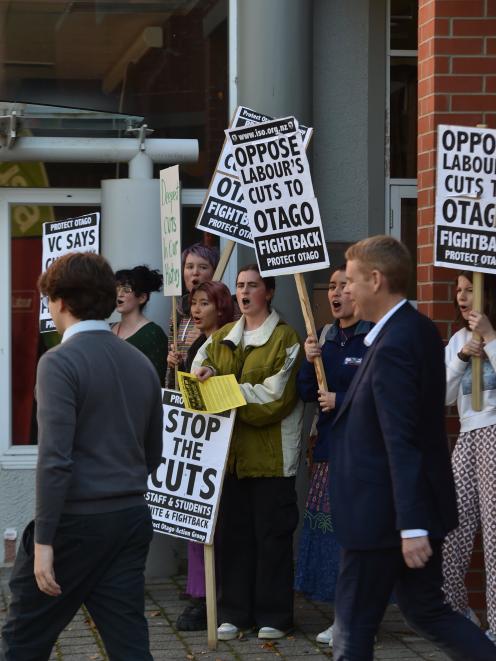
One would have been forgiven to think that when Prime Minister Chris Hipkins appeared before students and staff on a visit to the University of Otago campus 10 days ago that he would be making an announcement.
He offered as much to the crowd as what we have seen in the previous decade of government policy for tertiary education: nothing.
The Prime Minister faced an increasingly restless staff and student body. He answered like a politician would, through vague platitudes and anecdotes from his student days, when what staff and students need at this time is a vote of confidence, and an injection of government spending in Dunedin’s largest and most influential industry: tertiary education.
His flying visit to campus has come at a time when staff and student protests are at their highest in almost a decade. For a prime minister who likes to tout his days as a student leader, it’s clear he has forgotten what he once stood for.
Students are protesting increases in fees and the stagnation of student loans and allowances amidst a cost-of-living crisis. Staff are fighting for their bread and butter: their courses, their colleagues, reasonable workloads, appropriate time and funding to do their research. In short, staff are fighting for their jobs. And let’s remember the union line: staff conditions of working are student’s conditions of learning.
This week we have seen the first departmental review announced, in the National Centre for Peace and Conflict Studies. As an alumnus of the centre, I have experienced first hand the passion, expertise and support of the staff who now face potential redundancy. The Tertiary Education Union has heard from a source that more than 20 other reviews of departments may be on the cards in the next 18 months.
At the same time, university leaders claim they have no options, and that a reduction of less than 1% of student numbers in a year necessitates a 10% reduction in staffing. The numbers don’t add up. Indeed, it’s the erroneous projections of the university that have led to the problem at hand.
The truth is that when it comes to cuts, it is the University of Otago leadership, together with Universities New Zealand, that have cut themselves out of a conversation with the Government. Staff were told at a vice-chancellor’s forum a few weeks ago that the university needed to do more with less. When you add fewer staff to fewer courses, you don’t get better quality or more students. Less in this case simply equals less.
The Prime Minister last week, in turn, repeated a handful of times that the university was ‘‘autonomous’’ and that it had to make its own decisions. While autonomous sounds positive, the crowd heard through the political double-speak.
Our universities, Te Pukenga and the country’s three wananga are public institutions, funded almost exclusively through government funds, whether it be through student achievement component funding, research funding, or loans and allowances facilitated by the government. It is telling that most of our universities are struggling financially. There is a larger funding problem at play and the Government is not playing ball.
When quality academic and research staff are the very reason for the success of the university, cutting them to make a quick buck won’t pay off. The University Council is mistaken to think that the university is a business. Education is a public good, and the country is in desperate need for the bright scientific, medical, legal and, yes, creative minds that graduate year after year. If he were wise, the Prime Minister wouldn’t dare to ignore this problem much longer.
It is now time that the Government makes a commitment to tertiary education by funding the sector for what it’s worth.
And it’s time for university leaders to take the cuts off the table and put staff and students first.
— Daniel Benson-Guiu is a union organiser for the Tertiary Education Union, focusing on Te Pukenga.










